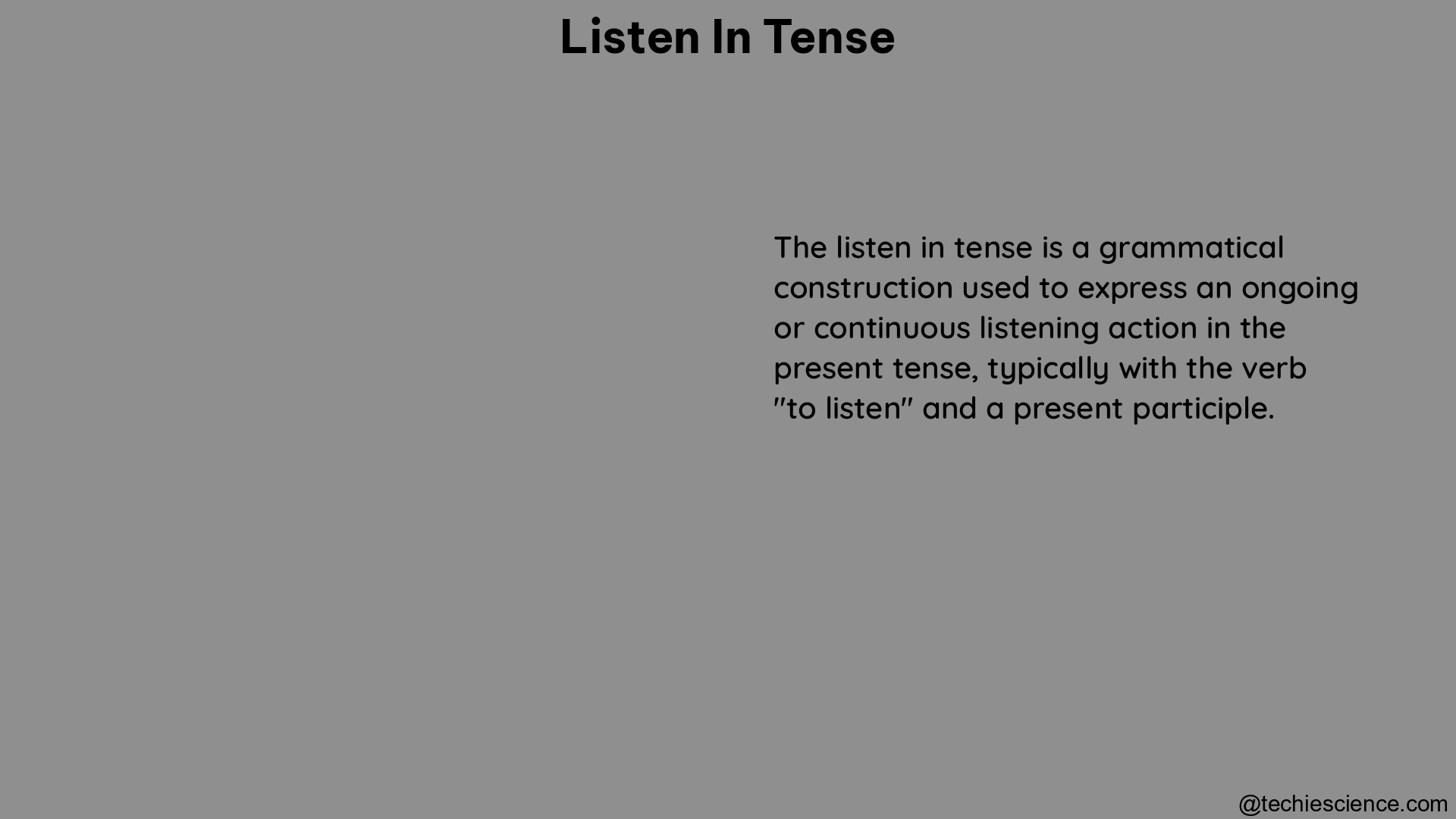The verb “listen” is a fundamental part of the English language, and understanding its conjugation in various tenses is crucial for effective communication. In this comprehensive guide, we will delve into the intricate details of the “listen” verb, exploring its usage across different tenses and providing a wealth of examples to solidify your understanding.
Present Tense
In the present tense, the conjugation of the verb “listen” is as follows:
Singular:
– I listen
– You listen
– He/She/It listens
Plural:
– We listen
– You listen
– They listen
Example: “I listen to the radio every morning.” or “She listens attentively during the lecture.”
Present Progressive Tense

The present progressive tense is used to describe an ongoing action in the present. The conjugation of “listen” in this tense is:
Singular:
– I am listening
– You are listening
– He/She/It is listening
Plural:
– We are listening
– You are listening
– They are listening
Example: “I am listening to the news right now.” or “They are listening to the teacher’s instructions.”
Past Tense
In the past tense, the conjugation of the verb “listen” is as follows:
Singular:
– I listened
– You listened
– He/She/It listened
Plural:
– We listened
– You listened
– They listened
Example: “I listened to the concert last night.” or “She listened carefully to the directions.”
Past Progressive Tense
The past progressive tense is used to describe an ongoing action in the past. The conjugation of “listen” in this tense is:
Singular:
– I was listening
– You were listening
– He/She/It was listening
Plural:
– We were listening
– You were listening
– They were listening
Example: “I was listening to the radio when the power went out.” or “They were listening to the teacher’s lecture when the bell rang.”
Present Perfect Tense
The present perfect tense is used to describe an action that has been completed in the past but has relevance in the present. The conjugation of “listen” in this tense is:
Singular:
– I have listened
– You have listened
– He/She/It has listened
Plural:
– We have listened
– You have listened
– They have listened
Example: “I have listened to that album many times.” or “She has listened to the new song on repeat.”
Present Perfect Progressive Tense
The present perfect progressive tense is used to describe an ongoing action that began in the past and is still continuing in the present. The conjugation of “listen” in this tense is:
Singular:
– I have been listening
– You have been listening
– He/She/It has been listening
Plural:
– We have been listening
– You have been listening
– They have been listening
Example: “I have been listening to that podcast for the past few weeks.” or “She has been listening to the same song on repeat all day.”
Past Perfect Tense
The past perfect tense is used to describe an action that was completed before another past action. The conjugation of “listen” in this tense is:
Singular:
– I had listened
– You had listened
– He/She/It had listened
Plural:
– We had listened
– You had listened
– They had listened
Example: “I had listened to the lecture before the exam.” or “She had listened to the instructions before starting the project.”
Past Perfect Progressive Tense
The past perfect progressive tense is used to describe an ongoing action that was in progress before another past action. The conjugation of “listen” in this tense is:
Singular:
– I had been listening
– You had been listening
– He/She/It had been listening
Plural:
– We had been listening
– You had been listening
– They had been listening
Example: “I had been listening to the audiobook for hours before I fell asleep.” or “They had been listening to the music for the entire party.”
Future Tense
In the future tense, the conjugation of the verb “listen” is as follows:
Singular:
– I will listen
– You will listen
– He/She/It will listen
Plural:
– We will listen
– You will listen
– They will listen
Example: “I will listen to the podcast on my commute.” or “She will listen to the teacher’s instructions carefully.”
Future Progressive Tense
The future progressive tense is used to describe an ongoing action in the future. The conjugation of “listen” in this tense is:
Singular:
– I will be listening
– You will be listening
– He/She/It will be listening
Plural:
– We will be listening
– You will be listening
– They will be listening
Example: “I will be listening to the audiobook during my flight.” or “They will be listening to the concert all evening.”
Future Perfect Tense
The future perfect tense is used to describe an action that will be completed before another future action. The conjugation of “listen” in this tense is:
Singular:
– I will have listened
– You will have listened
– He/She/It will have listened
Plural:
– We will have listened
– You will have listened
– They will have listened
Example: “I will have listened to the entire album before the concert starts.” or “She will have listened to the presentation before the meeting.”
Future Perfect Progressive Tense
The future perfect progressive tense is used to describe an ongoing action that will be in progress before another future action. The conjugation of “listen” in this tense is:
Singular:
– I will have been listening
– You will have been listening
– He/She/It will have been listening
Plural:
– We will have been listening
– You will have been listening
– They will have been listening
Example: “I will have been listening to the podcast for a month before the new season starts.” or “They will have been listening to the same song on repeat all day by the time the party ends.”
Conditional Tense
The conditional tense is used to express a hypothetical or imagined situation. The conjugation of “listen” in this tense is:
Simple Conditional:
– I would listen
– You would listen
– He/She/It would listen
Conditional Progressive:
– I would be listening
– You would be listening
– He/She/It would be listening
Conditional Perfect:
– I would have listened
– You would have listened
– He/She/It would have listened
Conditional Perfect Progressive:
– I would have been listening
– You would have been listening
– He/She/It would have been listening
Example: “I would listen to the lecture if I had the time.” or “She would be listening to the music if the volume wasn’t so low.”
Imperative
The imperative form is used to give commands or instructions. The conjugation of “listen” in this form is:
Singular:
– Listen!
Plural:
– Let’s listen.
Example: “Listen carefully to the instructions.” or “Let’s listen to the new album together.”
Infinitive
The infinitive form of the verb “listen” is:
- To listen
Example: “I want to listen to the podcast.” or “She needs to listen to the feedback.”
By mastering the conjugation of the verb “listen” in these various tenses, you will be able to express yourself more precisely and effectively in English. Remember to practice using the different forms in context to solidify your understanding and improve your language skills.
Reference:
- https://www.writingenglish.com/cverbs/listen.htm
- https://www.gymglish.com/en/conjugation/english/verb/to_listen
- https://www.wordreference.com/conj/enverbs.aspx?v=listen

Hi…. I am Goutam Datta. I have completed a double M. A. in English and B. Ed. I am a creative writer. Currently, I am a part of the LambdaGeeks.